We have already announced that we are glad to host Karen Swallow Prior here at the bookstore this coming Friday night, Friday, September 14th, 2018, at 7:00 PM when she will tell us about her brand new book On Reading Well: Finding the Good Life Through Great Books. If you are anywhere near York County here in south-central Pennsylvania, please feel welcome to join us. We’ll hear her lecture and read from her books, have some conversation, and eager friends will get some books signed. (For more information, see our last BookNotes post, or visit the Facebook events page, here.)
Dr. Prior’s On Reading Well is not the only brand new book on the charms and challenges of the reading life. We are so eager to tell you about two other new releases that help us realize the importance and joy of reading widely. Or promiscuously, as John Milton put it in the 17th century. Well get to that. So let’s hear it for three great new books about books.
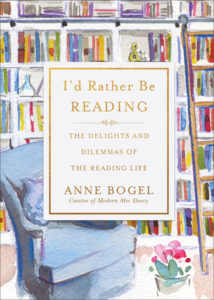 I’d Rather Be Reading: The Delights and Dilemmas of the Reading Life Anne Bogel (Baker Books) $14.99 Oh my, a small gift-type book, compact sized and slim, that is jam-packed full of advice about reading, making a winsome (but not weak) case for reading widely. Bogel admits to being a “certified book nerd” and I’m sure you will love to spend some time with her by looking over her shoulder in this brand new book of bookish ruminations. What a great, great little book this is!
I’d Rather Be Reading: The Delights and Dilemmas of the Reading Life Anne Bogel (Baker Books) $14.99 Oh my, a small gift-type book, compact sized and slim, that is jam-packed full of advice about reading, making a winsome (but not weak) case for reading widely. Bogel admits to being a “certified book nerd” and I’m sure you will love to spend some time with her by looking over her shoulder in this brand new book of bookish ruminations. What a great, great little book this is!
Book nerds — this is for you. But, interestingly, I think it could be very appealing and even inspiring for those who aren’t fully out-of-their-gourds-crazy about the call the books.
I am notorious — I think that’s the word, although I wish I could say legendary – for answering customers’ questions about the best book on a topic with lists that sometimes verge on being, shall we say, too much. Ask me about my favorite books on prayer or the arts or race or evangelism or worship or sex and I will name 10; 20 if you let me answer via email. I’m really not trying to show off when I do this but wanting to connect, to serve customers well, because there is in this diverse book brain of mine, surely something for everyone. But that’s the tricky part—determining what is the best book for a particular reader at a particular time in his or her life. Best book for whom I usually ask when somebody insists I declare the best in this or that field. Tell me more isn’t evasive, but a little front-end sleuthing to discern what might work best for a particular reader or group.
And so I was delighted when I heard about the blog Modern Mrs. Darcy and the podcast “What To Read Next” by book loving tastemaker Anne Bogel. A podcast offering advice on what to read next? Bookish guidance from a woman who extols the Emily Dickinson line, “I dwell in possibility” – wow.
Her tremendously lovely and smart new book, I’d Rather Be Reading:The Delights and Dilemmas of the Reading Life starts off with an enjoyable short chapter called “Confess Your Literary Sins” but she assures us that one really needn’t confess not liking certain classics or the award-winning books, not appreciating the great books or the cool books or the popular books. Sure we can all stand to grow, and the best readers are insatiably curious, trying new authors and genres, but, really: there are different kinds of books for different kinds of people. Ain’t it so! It’s funny, even, to learn how diverse this whole reading thing is – she chuckles about a lit prof with a PhD who hasn’t read Hamlet or a religion scholar who hasn’t read C.S. Lewis. But we can be honest about what we don’t know and be glad we like what we like. That is, we don’t really need to confess that we are passionate about what we like.
Which leads to other sorts of confessions she receives these days, as a public voice for reading, especially among people of faith. She goes on for a few quick pages with a wonderful, entertaining list of obsessions. She tells of people who write to her, to confess:
They teach ninth-grade English by day and currently binge on the Twilight series by night, for the sixth time in as many years. (“Please don’t tell my students.”)
They don’t understand how anyone could not love The Catcher in the Rye. They are obsessed with Holden Caulfield. They wonder what this says about them. They are not adolescent males, so they’re pretty sure it’s not good.
They’re obsessed with the Harry Potter books.
They’ve read the Outlander series eight times….
They own forty-two cozy mysteries, with covers all featuring a skein of yarn, a pie, or both.
They tried to read the latest thought-provoking National Book Award winner on the beach but couldn’t get into it. So they made an emergency vacation bookstore run for a stack of baby-blue books whose covers all bore sandy beach scenes, all of which were inhaled that week…
They haven’t read much of anything lately, unless their iPad counts. Or In Style magazine. Or the tabloid covers in the grocery store checkout line.
They’ve had the same book sitting on their nightstand for three years and haven’t opened it once.
She continues, telling us of a person who confessed to ordering pizza for dinner so they could finish their book. There’s the person who checked out a book from a library but still hasn’t returned it and now is afraid to show her face there. There are people she describes who have “book hangover” after finishing a compelling novel, moms and dads who have locked themselves in the bathroom so they could finish a book.
They think they love books too much. And they think they are alone.
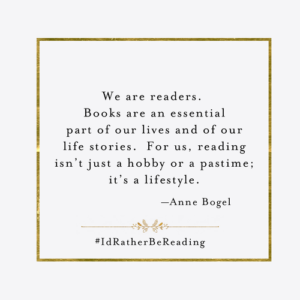 Anne Bogel’s new book will assure any such book addicts that they are not alone. And that we don’t have to be ashamed of our tastes and interests. In fact, after this faux-confessions bit, the second chapter is called “The Books That Find You.” Indeed – another reason I am wont to name more than just one or two books when somebody asks – after nearly 40 years of promoting books and reading, I still usually don’t quite know what exact book matches which exact reader. There’s mystery and magic to all this, and I do trust that God, perhaps disguised as a muse, working through a sales pitch or book review or BookNotes column, or a well designed book cover, helps the right book get to the person that needs it most. As midwives to this glorious process, we booksellers, reviewers, and literary cheerleaders, can’t take credit for the goodness that is birthed when a book finally finds its reader.
Anne Bogel’s new book will assure any such book addicts that they are not alone. And that we don’t have to be ashamed of our tastes and interests. In fact, after this faux-confessions bit, the second chapter is called “The Books That Find You.” Indeed – another reason I am wont to name more than just one or two books when somebody asks – after nearly 40 years of promoting books and reading, I still usually don’t quite know what exact book matches which exact reader. There’s mystery and magic to all this, and I do trust that God, perhaps disguised as a muse, working through a sales pitch or book review or BookNotes column, or a well designed book cover, helps the right book get to the person that needs it most. As midwives to this glorious process, we booksellers, reviewers, and literary cheerleaders, can’t take credit for the goodness that is birthed when a book finally finds its reader.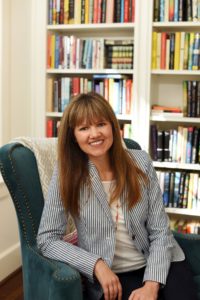
Bogel says nicely,
There are few one-size-fits all prescriptions for the reading life. This spurs all sorts of readerly dilemmas, but it also brings readers endless delight.
Ms. Bogel loves books and she understands book lovers, which is why so many will take joy and maybe solace in her reflections. She has great insight about being a better reader, reflects on what we bring to the page; she tells us nifty stories from how she chooses books and how she finds time to read. She offers sage input (for instance, she tells us to read an author’s acknowledgments first) and even has advice about bookshelves and organizing our volumes. Some of you know you need this.
The third chapter is called “I’m Begging You To Break My Heart” and is, like many of the short chapters, worth the price of the whole book. In a serious and telling rumination on grief and reading, and why we get all verklempt while reading, she writes,
I don’t relish crying over a book, but I’ll say this: it’s not easy to earn a reader’s tears – and if an author writes well enough to earn mine, I’m in.
We have touted a lot of books about books over the years here at BookNotes, and in the shop we have a shelf of books about books. These provide such joyful reinforcement for book lovers and, I think, help give an apologetic for reading for those who need such justification or encouragement. A few of these are just wonders and I revisit them often. For pastors (although it’s so wonderfully done, we suggest it to anyone) there’s Reading for Preaching: The Preacher in Conversation with Storytellers, Biographers, Poets, and Journalists by Cornelius Plantinga (Eerdmans; $14.00) and it is a must. I think if I were writing a book about all this, the nearest thing would be the fantastic, insightful, one-of-a-kind Reading for the Common Good: How Books Help Our Churches and Neighborhoods Flourish by C. Christopher Smith (IVP; $16.00), which, again, is one you have to put on your list. I sometimes start talks I give with breathtaking excerpts of The Word: Black Writers Talk about the Transformative Power of Reading and Writing edited by Marita Golden (Broadway Books; $14.99.) The Pleasures of Reading in a Distracted Age by the erudite Alan Jacobs (Oxford University Press; $19.95) is a tad heady but a true pleasure for those who like sophisticated writing. If you haven’t, and if you care about our common culture and the question about digital reading and on-line stuff, you really should read the beautifully approached and well-done The Shallows: What the Internet Is Doing to Our Brains by book reviewer and public intellectual Nicholas Carr (W.W. Norton; $15.95.) Although it is out of print, Terry Glaspey has a great book called Book Lover’s Guide to Great Reading: A Guided Tour of Classic & Contemporary Literature which is worth tracking down. He’s the smart, smart guy behind the wonderful 75 Masterpieces Every Christian Should Know: The Fascinating Stories Behind Great Works of Art, Literature, Music, and Film (Baker Books; $29.99.)
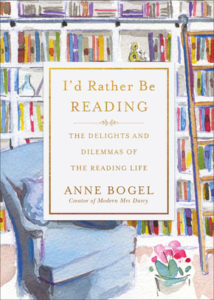 And now, I’d Rather Be Reading: The Delights and Dilemmas of the Reading Life by Anne Bogel must be added to that short list – I could list more if you really wanted – of must-read books about books and the reading life. I’d Rather Be Reading is short, light-hearted at times, even clever, but very smart. A friend of mine suggested to Ms Bogel that she request the publisher put a picture of her own favorite reading chair on the cover, and it has a soft, living room feel that is inviting. But yet, I suspect that Bogel isn’t all that highbrow or bourgeois; I bet she reads so widely that she has a book with her wherever she goes and will plunk herself down whenever and wherever she can. She invites us to read widely and well, even if we don’t have a library in our home or a big comfy chair. She even addresses this a bit in a chapter called “Bookworm Problems.” I bet many of our best Hearts & Minds friends and customers will relate.
And now, I’d Rather Be Reading: The Delights and Dilemmas of the Reading Life by Anne Bogel must be added to that short list – I could list more if you really wanted – of must-read books about books and the reading life. I’d Rather Be Reading is short, light-hearted at times, even clever, but very smart. A friend of mine suggested to Ms Bogel that she request the publisher put a picture of her own favorite reading chair on the cover, and it has a soft, living room feel that is inviting. But yet, I suspect that Bogel isn’t all that highbrow or bourgeois; I bet she reads so widely that she has a book with her wherever she goes and will plunk herself down whenever and wherever she can. She invites us to read widely and well, even if we don’t have a library in our home or a big comfy chair. She even addresses this a bit in a chapter called “Bookworm Problems.” I bet many of our best Hearts & Minds friends and customers will relate.
This would make a great book just to indulge yourself a bit if you like reading and owning books and it certainly will pay back the price of purchase by bringing you plenty of reassurance that your love for books isn’t weird and that you are not alone. But more, it provides good insight, lots of guidance, and stimulating recommendations. She’s got good taste. And, after all, in this wide, wild world of books, there’s truly, something for everyone.
Book Girl
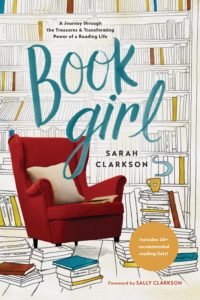 Book Girl: A Journey Through the Treasures & Transforming Power of a Reading Life Sarah Clarkson (Tyndale) $15.99 I am both thrilled and a tad frustrated that this spectacular book just came last week – it is one of three brand new books on reading that came out from Christian publishers this month and any one of them would be worthy of an excited announcement and a big push. With the understandably big buzz of Karen Swallow Prior’s weighty work on virtue formation by reading (you know we’re bringing her to Hearts & Minds this Friday night to discuss On Reading Well) and the charming I’d Rather Be Reading by podcast queen Anne Bogel, I certainly don’t want Sarah Clarkson’s amazing new book to get lost in the shuffle. It is so, so good, and you need to know about it. In a way, this book is close to what I often do when I give presentations on the value of reading and the role of reading in Christian discipleship and the joys of the reading life so I can say that I think (ahem!) that it is very, very important and stuff that needs to be said. It has a distinctively female take – it’s called Book Girl after all – but this book boy loved it and wants to recommend it with gusto. Male or female, you should get Book Girl right away, and an extra one to give away as a gift.
Book Girl: A Journey Through the Treasures & Transforming Power of a Reading Life Sarah Clarkson (Tyndale) $15.99 I am both thrilled and a tad frustrated that this spectacular book just came last week – it is one of three brand new books on reading that came out from Christian publishers this month and any one of them would be worthy of an excited announcement and a big push. With the understandably big buzz of Karen Swallow Prior’s weighty work on virtue formation by reading (you know we’re bringing her to Hearts & Minds this Friday night to discuss On Reading Well) and the charming I’d Rather Be Reading by podcast queen Anne Bogel, I certainly don’t want Sarah Clarkson’s amazing new book to get lost in the shuffle. It is so, so good, and you need to know about it. In a way, this book is close to what I often do when I give presentations on the value of reading and the role of reading in Christian discipleship and the joys of the reading life so I can say that I think (ahem!) that it is very, very important and stuff that needs to be said. It has a distinctively female take – it’s called Book Girl after all – but this book boy loved it and wants to recommend it with gusto. Male or female, you should get Book Girl right away, and an extra one to give away as a gift.
I remember reading the books of the mother of Sarah, Sally Clarkson, published what seems to be years ago and I thought they were absolutely better written and more interesting than 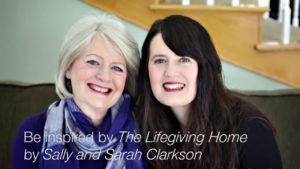 many of the strict and formulaic parenting books that helped us focus on the family in those years. (And I wonder if she is related to the 1970s era Eerdmans author Margaret Clarkson?) I recall her writing about family and marriage and pain and suffering in a voice that was thoughtful and wise, deep without being arcane. I think some linked her (or at least I do in my own mind) to C.S. Lewis and Francis & Edith Schaeffer, maybe to the likes of Luci Shaw and Madeline L’Engle. That is, she was theologically interesting and intelligent and artful. And now, she has a handful of books written with Sarah (such as The Life Giving Parent and The Life Giving Home.)
many of the strict and formulaic parenting books that helped us focus on the family in those years. (And I wonder if she is related to the 1970s era Eerdmans author Margaret Clarkson?) I recall her writing about family and marriage and pain and suffering in a voice that was thoughtful and wise, deep without being arcane. I think some linked her (or at least I do in my own mind) to C.S. Lewis and Francis & Edith Schaeffer, maybe to the likes of Luci Shaw and Madeline L’Engle. That is, she was theologically interesting and intelligent and artful. And now, she has a handful of books written with Sarah (such as The Life Giving Parent and The Life Giving Home.)
It is no wonder Sarah has grown up to be a writer of good books about home life, about parenting, about education, and, now, about the reading life. Her mom and dad valued reading and she was read to as a child. So, parents, let’s do this! Honey for a Child’s Heart by one of our patron saints, Gladys Hunt, remains a valuable aid to finding wholesome books by age group. The Read Aloud Handbook by American hero Jim Trelease is updated and should be a staple – borrow it from your local library and you’ll most likely need to buy one to keep. Recently, Zondervan published two winners that we’ve highlighted before but deserve a shout out here: The Read Aloud Family by Sarah MacKenzie and Give Your Child the World: Raising Globally Minded Kids One Book at a Time by Jamie Martin.) These are all resources to help us all make books and reading a more central part of our children’s formation. Such habits have born fruit as we can now see in the good prose and profound thoughtfulness coming from the pen of Sarah Clarkson.
Here is what you should know about the structure of Book Girl: A Journey Through the Treasures and Transforming Power of a Reading Life. It is not a memoir, as such – there are those, stories about reading (like, say, Will Schwalbe’s wonderful The End of Your Life Book Club or Reading Lolita in Tehran by Azar Nafisi or A Jane Austen Education: How Six Novels Taught Me About Love, Friendship, and the Things That Really Matter by William Deresiewicz. One of my favorite memoirs is more a collection of elegant essays about reading and is called The Gutenberg Elegies: The Fate of Reading in an Electronic Age by the remarkable Sven Birkerts. And truly one of my all time favorite memoirs, Reading the Mountains of Home by nature writer and professor John Elder is built around a set of hikes he took while reading a lesser-known Robert Frost poem. And, of course, there is the quintessential book memoir, the best — Booked: Literature in the Soul of Me by Karen Swallow Prior. Who else talks soberly about the regrets of losing her virginity in high school in a season she was reading Thomas Hardy’s Tess of the d’Urbervilles? But I digress.)
Rather, Book Girl by Sarah Clarkson is a series of theses: glorious assertions, essentially, of what books can do for you. You’ll have to buy the book to get the full and charming teaching about each of these benefits. Here are most of the chapter titles to whet your appetite and give you a sense of what you’ll learn (or be reminded of.)
- Books Can Broaden Your World
- Books Can Shape Your Story
- Books Can Stir You To Action
- Books Can Foster Community
- Books Can Open Your Eyes to Wonder
- Books Can Deepen Your Soul
- Books Can Impart Hope
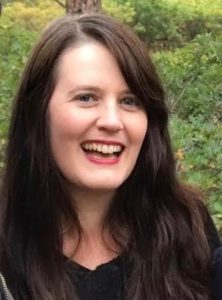 Oh my, it seems like she’s been listening in on some of my stock lectures on this stuff – ha! But she says it better; I loved Book Girl. Now, we can learn how much more there is to say about these benefits of books and the value of the reading life. There is so much good wisdom in here that I think anyone who likes to read and learn and grow will be underlining phrases and highlighting whole pages. Those of us who are confident this is important for the advancement of God’s Kingdom will want to share this with others. I think you could adapt the points and use them to teach others about the value of cultivating serious reading habits.
Oh my, it seems like she’s been listening in on some of my stock lectures on this stuff – ha! But she says it better; I loved Book Girl. Now, we can learn how much more there is to say about these benefits of books and the value of the reading life. There is so much good wisdom in here that I think anyone who likes to read and learn and grow will be underlining phrases and highlighting whole pages. Those of us who are confident this is important for the advancement of God’s Kingdom will want to share this with others. I think you could adapt the points and use them to teach others about the value of cultivating serious reading habits.
Do you have a library or bookstore in your church? Do they promote the sorts of books she recommends – from George MacDonald to Willa Cather to Frederick Buechner to Wendell Berry to Marilyn Robinson to Kathleen Norris? On her great website I recently saw a picture of her holding Saint Athanasius’ On the Incarnation. Still my beating heart.
(Her book lists in Book Girl about theological works are very, very substantive, by the way, and many of our customers will be delighted by her descriptions of important books to read more directly for faith formation.)
But when I noticed (reading the acknowledgements first, of course) that she cited a Wendell Berry novel, I knew I had found a kindred spirit. There are certain writers (fiction and nonfiction) and certain novels and poems that if a person likes them, I immediately am inclined to trust them more, knowing that much, at least, about their judgments and tastes. Clarkson says so 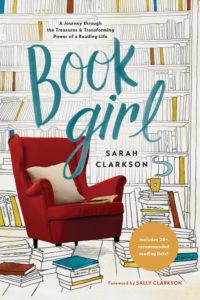 much here that I love that I want to just shout from the rooftop. Book Girl offers good, good content, intelligent but not daunting. It’s not only reassuring and so nice to hear her passion for good books and reading widely, but I think it is truly vital, giving us words and talking points to convince others about the value of books and the importance of study. I’m hoping you take me literally here – we all know folks who don’t read much and we also know people who wish they’d read more, but just can’t find the time, energy, or motivation. Book Girl will inspire them. You should give her book away and, at least, master her talking points about the value of the printed page.
much here that I love that I want to just shout from the rooftop. Book Girl offers good, good content, intelligent but not daunting. It’s not only reassuring and so nice to hear her passion for good books and reading widely, but I think it is truly vital, giving us words and talking points to convince others about the value of books and the importance of study. I’m hoping you take me literally here – we all know folks who don’t read much and we also know people who wish they’d read more, but just can’t find the time, energy, or motivation. Book Girl will inspire them. You should give her book away and, at least, master her talking points about the value of the printed page.
Book Girl also contains tons of lists, suggestions, titles to check out at the library, or put on your Hearts & Minds wish list. In fact, there are over 20 full book lists interspersed though out with fabulous short reviews and annotations. I really liked Clarkson’s explanations about the books to read (whether I had read the book or not) and plan to use it as a guide for my own experience with good fiction, especially. I loved the inspiring, wise, visionary essays about the reading life, but these book lists make it that much more useful, too, to solve the problem of what to read. It will be a guide that book groups and curious readers can use for years to come.
On Reading Well: Finding the Good Life Through Great Books
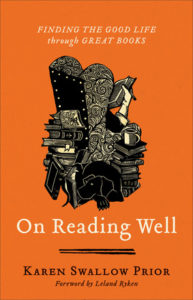 On Reading Well: Finding the Good Life Through Great Books Karen Swallow Prior (Brazos Press) $19.99 I have written about this before, announcing it before it came out and just last week sharing a short essay I wrote for our local newspaper on the significance of character formation as we discuss the important stuff of our times.
On Reading Well: Finding the Good Life Through Great Books Karen Swallow Prior (Brazos Press) $19.99 I have written about this before, announcing it before it came out and just last week sharing a short essay I wrote for our local newspaper on the significance of character formation as we discuss the important stuff of our times.
Perhaps trying to channel a bit of James K.A. Smith and his insights found in You Are What You Love: The Spiritual Power of Habit (Brazos Press; $19.99) I simply explained in that op-ed piece and expanded BookNotes column that Karen Swallow Prior shows us in her new book how reading great literature can help us cultivate virtue; we re-imagine the story we find ourselves in by reading good books and that changes us, from the inside out, perhaps even making us people of better character. Reading matters. So much of the conflict in our current public lives is related to deformed character and the disregard for virtue. Reading well – with openness to being shaped by the form and content of truly good books – matters. We are so very glad Dr. Prior has agreed to come to our store (this Friday night – join us at 7:00 PM if you are able) reminding us, as I said in the last BookNotes, of why what we do what we do as booksellers. We think books can really help people in often profound, formative ways, and it’s nice to have someone remind us of this powerful truth.
Here’s a short, thoughtful essay she wrote on Jane Eyre and Our Age of Authenticity that might show you how perceptive she is and how she offers literary insight even about the nature of our cultural moment.
Maybe it will remind you, too, of what you do as a reader and a book lover (and friend of Hearts & Minds.) We all need to be reminded, sometimes, of the power and meaning of this delightful obsession of ours, buying books, reading reviews, reading widely and carefully. Maybe you just will enjoy learning about all this again, or maybe you need reminded. Or maybe you’ve never quite been captured by the book bug, so reading her book (or hearing her live in Dallastown, or in Lancaster the next night at the downtown Square Halo Gallery) will inspire you to take up this challenge of the reading life. Whether you are nicely reminded of a long-held conviction or challenged anew: books matter. As my friend Steve Garber has written in an extraordinary essay, “Good Books Matter.” This poignant, eloquent essay made its way more or less into Steve’s extraordinary book called The Fabric of Faithfulness: Weaving Together Belief and Behavior (IVP; $19.00.) It is highly recommended for those pondering these very matters with Karen.
There is very much I could say about On Reading Well. As we’ve explained, Ms. Prior links a particular classic Christian virtue to one of a handful of novels, both old (Pilgrims Progress, 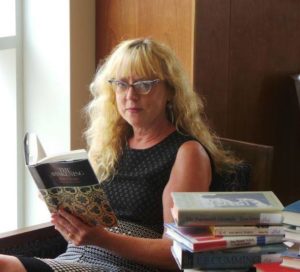 Tale of Two Cities, even The History of Tom Jones which is one of the early Victorian novels that attempted to bring moral meaning to the contemporary novel) and fairly contemporary ones, from Gatsby, a few short stories by George Saunder’s to the vivid, dark stories of Cormac McCarthy. (Her piece on the virtue of hope in The Road is fantastic, by the way!) This is most of what you need to know to enjoy and learn from On Reading Well — she links a particular virtue such as temperance, prudence, faith, kindness, or, patience to a particular novel or short story. What’s not to like about learning courage from Jim in The Adventures of Huckleberry Finn or chastity from Edith Wharton, humility from Flannery O’Connor, or faith from the hard story of persecuted monks in Endo’s profound work, Silence. And wait ‘til you see what she does with Persuasion by Jane Austen that, for full disclosure, I’ve never read. You?
Tale of Two Cities, even The History of Tom Jones which is one of the early Victorian novels that attempted to bring moral meaning to the contemporary novel) and fairly contemporary ones, from Gatsby, a few short stories by George Saunder’s to the vivid, dark stories of Cormac McCarthy. (Her piece on the virtue of hope in The Road is fantastic, by the way!) This is most of what you need to know to enjoy and learn from On Reading Well — she links a particular virtue such as temperance, prudence, faith, kindness, or, patience to a particular novel or short story. What’s not to like about learning courage from Jim in The Adventures of Huckleberry Finn or chastity from Edith Wharton, humility from Flannery O’Connor, or faith from the hard story of persecuted monks in Endo’s profound work, Silence. And wait ‘til you see what she does with Persuasion by Jane Austen that, for full disclosure, I’ve never read. You?
Further, there are good reflection questions for your own pondering or for groups. I’m sure any lively book club would get a kick out of doing a few session on these good discussions.
As Karen herself says one of the goals of an attentive reading is not to find simple answers from the characters in the story but to learn to ask good questions, even questions about ourselves. Yes!
As we have said in our other mentions of the book — and as everyone notices when they pick up the volume — there are very interesting linocuts, hand done by artist and printmaker Ned Bustard, one for each chapter. In an almost uncanny way these artistic visions capture something essential about the novel under examination. A few are sheer genius. We hope to show a few of the prints during our Hearts & Minds event with Karen on Friday night but the Bustard’s are hosting her in Lancaster on Saturday evening at the Square Halo Gallery in the Lancaster Trust Building. The original artwork will be on expertly hung and on display there for a spell.
I suppose I should point out a few things that might be important to know. There are some carefully worded, serious sections about virtue theory that some might find slow going. It isn’t like reading Alistair McIntyre (whom she cites) or Aquinas (whom she also cites) but this includes some sophisticated (if basic) introduction to the field of character formation by way of reflecting on the virtues and it isn’t simple. It isn’t daunting and for some it will be delightfully informative, but it’s thoughtful work she’s doing here.
Dr. Prior works at a conservative evangelical university (one many might think it is more fundamentalist in reputation than evangelical, seemingly more akin to Bob Jones than 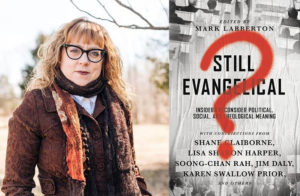 Wheaton, except for the presence of remarkable staff like her.) She carries the banner for evangelicalism well and tells about it nicely in her excellent and enjoyable testimony of why she still identifies as evangelical in her chapter in Still Evangelical? Insiders Reconsider Political, Social, and Theological Meaning (IVP; $17.00.) It’s a book I’ve been trying to get people both evangelical and not to read. Her piece therein is solid and inspiring.
Wheaton, except for the presence of remarkable staff like her.) She carries the banner for evangelicalism well and tells about it nicely in her excellent and enjoyable testimony of why she still identifies as evangelical in her chapter in Still Evangelical? Insiders Reconsider Political, Social, and Theological Meaning (IVP; $17.00.) It’s a book I’ve been trying to get people both evangelical and not to read. Her piece therein is solid and inspiring.
So, for such an evangelical scholar one might have expected a little more Paul and a little less Plato, perhaps more Amos and less Aristotle. (Okay, I’m trying too hard with the alliterations.) 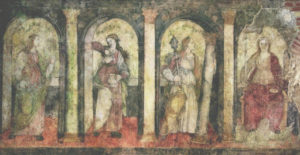 The way in which virtue is discussed – cardinal virtues and theological ones and heavenly ones — offers a big nod to a big tradition, but unless one likes that sort of accommodation to that particular way of telling the story of virtues, it might be a little curious. I suppose this might be a criticism (although for me it is a more inchoate instinct of concern and not a developed critique) but I note it here mostly as a heads up; you will benefit greatly from reading the first chapter which nicely summarizes this sort of virtue theory work, but it does draw on Aristotle and that ancient, classical language and taxonomy of virtue. I wondered why she didn’t at least bring Stanley Hauerwas into the conversation.
The way in which virtue is discussed – cardinal virtues and theological ones and heavenly ones — offers a big nod to a big tradition, but unless one likes that sort of accommodation to that particular way of telling the story of virtues, it might be a little curious. I suppose this might be a criticism (although for me it is a more inchoate instinct of concern and not a developed critique) but I note it here mostly as a heads up; you will benefit greatly from reading the first chapter which nicely summarizes this sort of virtue theory work, but it does draw on Aristotle and that ancient, classical language and taxonomy of virtue. I wondered why she didn’t at least bring Stanley Hauerwas into the conversation.
This part, as important as it is, isn’t as fun as I’d Rather Be Reading or as inspiring as Book Girl. Both of those books will pull your little bookish heart-strings right away and you’ll be smiling with recognition from the first lovely pages to the last. Nonetheless, On Reading Well must start as it does, reflecting on the need for inner transformation and a teacherly overview of the discipline. It might make you smile just a bit to see a prof at Jerry Falwell’s Liberty University sounding a bit like a scholastic in the tradition of the good Catholic Doctor Thomas Aquinas. I’m sure the Thomas Road Baptist Church near her campus isn’t named after that Thomas.
(An aside for maybe the four or five friends of BookNotes who care: it’s good to have Dr. Prior, at Liberty University, of all places, so conversant in the medieval scholastic tradition — the virtue theory of Aquinas is a whole lot better than the simplistic Biblicism and anti-intellectualism for which most of American fundamentalism is known. So my hat is truly off to her, there; she’s super smart and this book is a good indication of her scholarly diligence and it’s good to be rooted in such a respected, classical tradition. Still, as an erstwhile Presbyterian Reformer, I might ask how Abraham Kuyper’s doctrine of “the anti-thesis” or Dooyeweerd’s assessment of scholasticism’s unhealthy reliance on a nature vs grace ground motive, or even Francis Schaeffer’s call to reject accommodation to Greek epistemologies might help us get a more deeply Biblical accent in talking about virtue, rooted in insight about wisdom and our call to discern creation’s speaking, moment-by-moment, rather than borrowing willy-nilly from Catholic sources that depend upon pagan Aristotle. Just asking for a friend.)
So, just know: there’s some teacherly stuff about virtue and character formation that may seem a little less warm and inspiring as one might expect from a book about literary goodness. And that teacherly stuff is rooted in a tradition about the story of virtue that itself might need to itself be studied just a bit. It might not hurt to wonder what Calvin Seerveld, for instance, just as one important scholar, might say in his books like A Christian Critique of Art and Literature about reading literature for virtue. I suspect there are other theological and philosophical traditions that want to open up human responsibility and wisdom but use other sorts of language and have other understandings of a mature and faithful person and the way art and imagination works in our personal and communal lives. Karen herself realizes that and in a lovely rumination in the end of the introduction speaks about the aesthetics of stories, the experiential nature of entering a plot of a novel. In other words, one can hardly read the introduction to Karen’s thoughtful book without entering a larger conversation about the role of literature, the calling to cultivate our character, the nature of whole-life discipleship and our interior lives, and ideas we have about the role of the arts in helping us along that journey, age old questions about reason and imagination. One might even wonder – even if we buy the whole Aquinas-based view of virtue that Prior draws upon – if this is the task of art, to stimulate our virtue? I’m not saying it is not, I’m just saying it is a live question, even though the iconic evangelical lit scholar Leland Ryken in his beautifully economical and very positive introduction insists that Prior gets it just right.
A second heads-up, less obscure and perhaps more immediately urgent: there are necessarily spoilers in a book that explains the plot and personality and ethics and vision of a dozen or so novels. There’s no way to be coy about this: there are spoilers. I do not think this ruins the stories for those who have not read all of these novels (or short stories) and it may even help. For me, at least, that is the case – knowing what to look for and what to be attentive to doesn’t diminish the pleasure of entering the story any more than a travel guide hurts your journey into a strange, new city. No need to be grumpy about this – you’ll thank her later, I’m sure.
Thirdly: I don’t know if this is a warning or just an observation, but I suspect a few folks may think that reading up on the power of great books to shape our interior lives and seeing example after example of how virtue can be gleaned by imbibing in classic literature will, in fact, somehow make them more virtuous. I’m afraid it isn’t quite that easy.
I actually think there is something to this, though. For instance, I believe that reading a book about prayer is obviously not the same kind of activity as praying. But it is a close second. That is, I learn prayerful attitudes and take in spiritual insight about praying from slowing down and focusing and reading carefully a book on prayer. It is no substitute for praying, but it helps.
Similarly, reading about great novels isn’t the same as reading those novels, but it helps. And learning about the virtues found in those stories doesn’t easily impart those benefits to you, but it helps. On Reading Well doesn’t offer magic bullets of great goodness if you read, say, Tolstoy or Twain, let alone Prior’s reflections on them. But watching Prior in action, exegeting those passages, drawing insight from them, explaining stuff about them, may just give you a hunger for doing that kind of thing yourself. That is, she is a teacher of literature, not a guru; she is a professor, not a spiritual director. Having said that, go at it with earnest eagerness and see what happens. She doesn’t say nearly enough about the “how” of all this – in their more casual way I’d Rather Be Reading and Book Girl help show how it works – but Prior just invites us into the stories, reminding us of these cardinal, theological, and heavenly virtues as we read and ponder the tales. It isn’t all we need to do to become virtuous, but it sure can’t hurt, eh?
Ms Prior says this herself in her own memoir, Booked. In her beautiful reflections there she says:
Although I know that what is true in fiction isn’t always true in real life, I still somehow – as a teacher of literature and as a student of literature – want all of the lessons that can be learned from books to make an immediate transfer from the pages to the minds and lives of those who read them.
But they don’t. The pages of books can change lives – as they have done mine – but its not always so simple a transaction as merely reading the book and walking away, life transformed. It takes time for this to happen. If it happens at all.
“Life,” she continues, “like a great book, is complicated.”
One thing that should be clear in On Reading Well is how well-suited the author is for this exact book. Allow me two big claims about this that I hope convince you that this is a great match-up of author and topic, and therefore is a book with a natural and vital sort of integrity. It’s a book that you really should get.
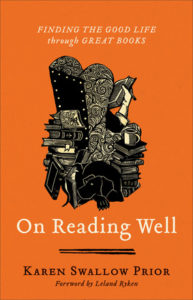 Firstly, Prior just loves these stories. I know this from other writing that she has done (more on that in a minute) and I wish it came through even more clearly in the book, although it does come through nicely. My hunch is she’s being a bit professorial and wanting to guide readers to discover the joys of reading the story – and the process, the art, of allowing the stores to shape them for the better – for themselves. She doesn’t gush, much, but Dr. Prior is a lover of literature, par excellence, and she trusts the stories are artful and powerful enough to do their thing on open-hearted readers. She is a bit nerdy (especially about Victorian stuff) and this passion for the printed page should inspire us all. She ends her introduction with the lines of Puritan Richard Baxter who says,“Good books are a very great mercy to the world.” It is good to be in conversation with someone who knows this so deeply in her bones.
Firstly, Prior just loves these stories. I know this from other writing that she has done (more on that in a minute) and I wish it came through even more clearly in the book, although it does come through nicely. My hunch is she’s being a bit professorial and wanting to guide readers to discover the joys of reading the story – and the process, the art, of allowing the stores to shape them for the better – for themselves. She doesn’t gush, much, but Dr. Prior is a lover of literature, par excellence, and she trusts the stories are artful and powerful enough to do their thing on open-hearted readers. She is a bit nerdy (especially about Victorian stuff) and this passion for the printed page should inspire us all. She ends her introduction with the lines of Puritan Richard Baxter who says,“Good books are a very great mercy to the world.” It is good to be in conversation with someone who knows this so deeply in her bones.
Secondly, besides her great love for the literature that shines through (if even restrained a bit, virtuously prudent and temperate and humble as she is) Karen Prior knows that serious Christians must engage their world, serving God in all of life, bearing witness to Christ’s Kingdom in, but not of, the surrounding culture. She uses her significant intellect and great knowledge of history to marshal not only desire for literature, and not only desire for virtue from great literature, but for the sort of Christian character formation that propels one to action in the fallen world. This comes up over and over in her reflections on these great novels, insights about the very real sadness of this sinful world, but also the very real possibility of redemption, of hope and goodness. Virtue – Biblically understood – is not only a personal matter of being, say, honest or kind, privately moral. Rather, true virtue spills out into all of life, compelling us to be involved in the issues of the day, standing for justice and being courageous in efforts to make a difference.
Prior herself bears witness to these truths; we need not go into it much here, but there are those within her own Southern Baptist culture that think she is a heretic. She is beloved by many, yes, but is also hated, with terrible, awful stuff poured out at her. Why? Oh, perhaps  because she is a representative of evangelical faith communities for the Humane Society and has written stuff about treating animals with dignity. (She has a chapter in Every Living Thing, an anthology attempting to bring a variety of religious voices into the conversation about animal well-being.) Being green seems to be a red flag for some. Or because she has arranged conversations to bring together in civil discourse those who are pro-life and those that are pro-choice. That she is a thoughtful, moderate, socially-engaged evangelical woman — she works with guys like Russell Moore and Daniel Darling, recent author of The Dignity Revolution, in the public policy division of her denomination – has made her a lightning rod for much spiteful opposition.
because she is a representative of evangelical faith communities for the Humane Society and has written stuff about treating animals with dignity. (She has a chapter in Every Living Thing, an anthology attempting to bring a variety of religious voices into the conversation about animal well-being.) Being green seems to be a red flag for some. Or because she has arranged conversations to bring together in civil discourse those who are pro-life and those that are pro-choice. That she is a thoughtful, moderate, socially-engaged evangelical woman — she works with guys like Russell Moore and Daniel Darling, recent author of The Dignity Revolution, in the public policy division of her denomination – has made her a lightning rod for much spiteful opposition.
Which sort of makes sense because she wrote a major biography of another woman who in the late 1700s faced extraordinary backlash against her her literature, her polemics, and her activism, namely the Christian abolitionist, Hannah More. Anyone who has read anything about the heroic William Wilberforce (or seen the thrilling movie, Amazing Grace) knows that the fight to end slavery in England, led famously by Wilberforce, would not have been successful without the art and gumption of the writer/activist Hannah More.
Fierce Convictions: The Extraordinary Life of Hannah More
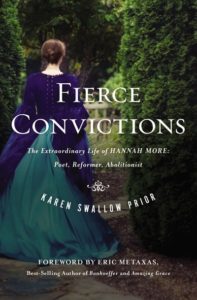 Fierce Convictions: The Extraordinary Life of Hannah More Karen Swallow Prior (Thomas Nelson) $24.99 I so enjoyed Eric Metaxas’s fabulous, energetic foreword to Fierce Convictions, Karen Swallow Prior’s marvelous and important biography of 18thcentury British abolitionist Hannah More, where Metaxas writes about almost wanting to stop his research on Wilberforce (that gave us the book Amazing Grace) to focus on Hannah More. As he tells it, he only could pray that somebody else would soon take on this gargantuan job, writing the first major biography of this amazing pre-Victorian writer and public voice for social justice. It speaks volumes that Karen Swallow Prior – who loves books so much, but also has this desire to see evangelical faith as an agent for good in the world – took up the task. Her Fierce Convictions isn’t precisely about virtue, but, oh my, what a virtuous woman Hannah More was. And how influential. In Prior’s hands, this More biography makes history come to life and shows us what the “end game” of all this talk about “the good life” is all about.
Fierce Convictions: The Extraordinary Life of Hannah More Karen Swallow Prior (Thomas Nelson) $24.99 I so enjoyed Eric Metaxas’s fabulous, energetic foreword to Fierce Convictions, Karen Swallow Prior’s marvelous and important biography of 18thcentury British abolitionist Hannah More, where Metaxas writes about almost wanting to stop his research on Wilberforce (that gave us the book Amazing Grace) to focus on Hannah More. As he tells it, he only could pray that somebody else would soon take on this gargantuan job, writing the first major biography of this amazing pre-Victorian writer and public voice for social justice. It speaks volumes that Karen Swallow Prior – who loves books so much, but also has this desire to see evangelical faith as an agent for good in the world – took up the task. Her Fierce Convictions isn’t precisely about virtue, but, oh my, what a virtuous woman Hannah More was. And how influential. In Prior’s hands, this More biography makes history come to life and shows us what the “end game” of all this talk about “the good life” is all about.
Do you want to know why Prior pours herself into writing a book like On Reading Well and goes on about virtue and character and inner transformation by reading good novels? It is, I gather, because she is hoping that her students, and those of us who read her on reading well, will maybe end up something like Hannah More. Now more than ever we need kind and good and merciful Christians who are prudent and humble and committed to social righteousness and public justice. We need woman and men like Hannah More and William Wilberforce, and Prior seems to think, or so it seems to me, that reading well is not only an avenue to personal virtue but to the formation of whole-life disciples of Jesus who will live out their faith in the marketplace and public square and work for renewal and goodness in all corners of our common life. Like Hannah More, Ms. Prior herself is a literary teacher, an artist, an activist. Three big cheers for that, eh? I so admire her.
Won’t you join us in supporting this kind of work by ordering a couple of her books? As I sometimes say, Read for the Kingdom! Or as Chris Smith’s book title puts it, Read for the Common Good.
Booked: Literature in the Soul of Me
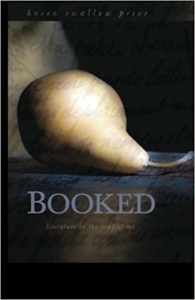 Booked: Literature in the Soul of Me Karen Swallow Prior (T.S. Poetry Press) $17.99 I mentioned Karen Swallow Prior’s true love of books. Like her page-turning sisters mentioned above, Anne Bogel (I’d Rather Be Reading) and Sarah Clarkson (Book Girl), she’s smitten. Is the Pope Catholic? Wowza, this is so true, and it is abundantly, beautifully, clear in her creative memoir, Booked: Literature in the Soul of Me. I have told you about that before, over the years, celebrating that she came up with this delicious idea of doing a memoir – her own memories of her growing up and into young adulthood – by way of describing a book that meant the most to her in that era of her life. What a grand idea, an autobiographical survey of the books that she loved or that had influenced her, season by season, through her (shall we say?) ups and downs. Many of us could draw up such a table of contents, at least – that would be a fun experiment, no? (for me it would also be the record albums that were playing year by year) — but few could pull off such a project as gracefully and with such solid, wise, insight as Prior.
Booked: Literature in the Soul of Me Karen Swallow Prior (T.S. Poetry Press) $17.99 I mentioned Karen Swallow Prior’s true love of books. Like her page-turning sisters mentioned above, Anne Bogel (I’d Rather Be Reading) and Sarah Clarkson (Book Girl), she’s smitten. Is the Pope Catholic? Wowza, this is so true, and it is abundantly, beautifully, clear in her creative memoir, Booked: Literature in the Soul of Me. I have told you about that before, over the years, celebrating that she came up with this delicious idea of doing a memoir – her own memories of her growing up and into young adulthood – by way of describing a book that meant the most to her in that era of her life. What a grand idea, an autobiographical survey of the books that she loved or that had influenced her, season by season, through her (shall we say?) ups and downs. Many of us could draw up such a table of contents, at least – that would be a fun experiment, no? (for me it would also be the record albums that were playing year by year) — but few could pull off such a project as gracefully and with such solid, wise, insight as Prior.
A Book for Hearts & Minds: What You Should Read & Why
This becomes even clearer in a gorgeous, unforgettable essay she wrote that I am reluctant to even tell you about, for fear of boasting, but I so want to say it. I’m reluctant because we figure into it a bit.
Do you recall that our friends at Square Halo Books – the beloved Bauers and Bustards — created, without us knowing about it, something like a festchrift (which is most often a collection of essays for a retiring professor, compiled as a gift from his or her students, in tribute.) Well, Beth and I aren’t professors and we’re not retiring, but a big handful of great authors each weighed in with a chapter about their own favorite books in their respective fields (offering chapters similar to what I sometimes do at BookNotes: listing a batch of must-reads in a given topic.)
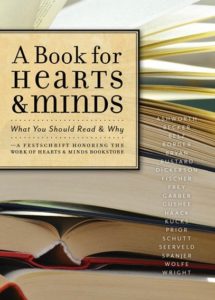 The book is called A Book for Hearts & Minds: What You Should Read & Why – A Festchrift Honoring The Work of Hearts & Minds Bookstore (Square Halo Books; $18.99) and I suppose it’s fair to say we are one of the only places that stocks this anthology of great chapters about great books. What other book has Calvin Seerveld and Ned Bustard, N.T. Wright and David Gushee, Matthew Dickerson and Steve Garber, chapters on the best books about the Bible and cookbooks and poetry and urban planning and history and fantasy and creation-care and film more?
The book is called A Book for Hearts & Minds: What You Should Read & Why – A Festchrift Honoring The Work of Hearts & Minds Bookstore (Square Halo Books; $18.99) and I suppose it’s fair to say we are one of the only places that stocks this anthology of great chapters about great books. What other book has Calvin Seerveld and Ned Bustard, N.T. Wright and David Gushee, Matthew Dickerson and Steve Garber, chapters on the best books about the Bible and cookbooks and poetry and urban planning and history and fantasy and creation-care and film more?
Karen Swallow Prior’s great chapter in A Book for Hearts & Minds is simply called “Literature” but that doesn’t do it justice – it is drawn mostly from Booked and has a bit of memoir-ish telling of her own story (starting a lending library in her girlhood basement) and name dropping all manner of childhood book favs.
And lists her several “must read” literary classics and why she so recommends them.
As broad as my tastes run and as interested as I am in all this stuff – new chapters from N.T. Wright and Calvin Seerveld and Steve Garber and Gregory Wolfe – I must admit I took up Prior’s right away. A whole chapter of a renowned Christian literary critic writing about her love for books! And her most urgently recommended classic novels! Beth and I were honored by the whole festchrift honoring our 35 years in bookselling, but having Dr. Prior included meant so much.
And so, we love our books here at at the family-owned, indie-spirited Hearts & Minds. Sure, we carry gift items, CDs, church supplies, cards, kids’ books aplenty and most of the stuff you’d find in most religious bookstores. But we have more books than most and are happy to say that our shelves are jam-packed with quality fiction and nonfiction. We are grateful for publishers who publish great books about books, like those by Anne Bogel, Sarah Clarkson, and Karen Swallow Prior. We are honored to carry these treasures by these three women, fellow book nerds, and we are confident that their volumes are gifts from God, able to transform your life and brighten our world. Read for the Kingdom.
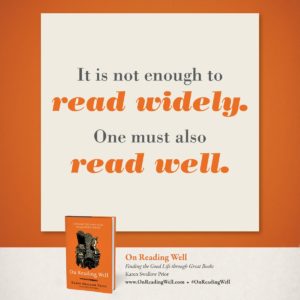
BookNotes

SPECIAL
DISCOUNT
ANY BOOK MENTIONED
20% OFF
order here
this takes you to the secure Hearts & Minds order form page
just tell us what you want
inquire here
if you have questions or need more information
just ask us what you want to know
Hearts & Minds 234 East Main Street Dallastown PA 17313
read@heartsandmindsbooks.com
717-246-3333
